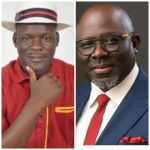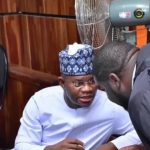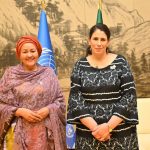Youth, Power & Politics: Rethinking Participation in Nigeria’s Democratic Future
By Dr. Aiyeku Olufemi Samuel
Co-Founder & Lead Consultant, Global Human Capital & Energy Management Limited Governance Analyst | Development Economist | Policy Consultant | Strategic Development Advocate
Introduction: The Urgency of Now
Nigeria stands at a crossroads where its greatest demographic asset the youths still largely excluded from meaningful political power and participation. With over 70% of the population under the age of 35 (National Population Commission, 2023), Nigeria is a youthful nation being governed by an aging elite.
The question is no longer “Are the youth interested in politics?”
The real question is:
“Why is a generation that is digitally connected, socially conscious, and politically vocal still structurally sidelined in Nigeria’s democratic process?”
The answer lies in the lack of strategic political education, systemic bottlenecks, and superficial engagement that has kept the Nigerian youth on the sidelines tweeting, protesting, and commenting but not yet leading.
Rhetorical Realities: Think About It
How many Nigerian youths can name their local government chairman or councilor?
Why do millions of young people show up for protests and hashtags, but not at the ballot box or party conventions?
Can we build a new Nigeria on social media trends alone, without institutional representation?
These questions are uncomfortable, yet necessary.
“The price good men pay for indifference to public affairs is to be ruled by evil men.” – Plato
The Illusion of Participation
The End SARS movement in 2020 awakened a generation. Youths organized, fundraised, protested, and spoke truth to power. But what followed? No formal structures, no political takeover, no generational representation at the polls. Social media activism is not political strategy.
According to INEC’s 2023 voter data, over 48 million registered voters were between the ages of 18–35, representing the largest voting bloc. Yet, youth voter turnout dropped to under 30%, while older elites retained legislative and executive power.
Clearly, youth involvement is high in volume, but low in structure. This imbalance must be addressed.
Key Challenges Facing Youth Political Participation
• Lack of Political Education
Many youths understand protest, but few understand policy formation, political structures, or grassroots organizing.
• Systemic Barriers
Party delegate systems are exclusionary.
Nomination forms cost millions.
Political godfathers dominate decision-making.
• Cynicism and Distrust
Years of failed leadership and unfulfilled promises have created a culture of disengagement among young Nigerians.
• Economic Disempowerment
Youth unemployment hovers around 40% (NBS, Q2 2023). How can the politically poor fund a campaign or run for office?
Solutions and Recommendations
• Institutionalize Political Education
Civic and political education should be reintroduced from secondary school to NYSC, with practical modules on governance, budgeting, and elections.
• Youth in Political Parties
Beyond protests, young people must join political parties, contest for ward positions, and influence internal decision-making.
• Electoral Reforms
INEC and the National Assembly must push for inclusive reformssuch as lowering nomination fees, introducing youth quotas, and digital voting technologies to encourage participation.
• Funding Alternatives
Establish youth-focused political finance platforms like cooperatives, crowdfunding, and donor circles to support credible youth candidates.
• Strategic Mentorship & Intergenerational Dialogue
Encourage a pipeline of young leaders through structured mentorship by technocrats, retired public servants, and reform-minded elders.
“It is not enough to curse darkness. You must light a candle.” – Chinese Proverb
A Call to Purpose, Not Just Protest
We must move from activism to strategy, from keyboard warriors to polling agents, from emotional outbursts to policy blueprints.
Yes, hashtags are powerful. But ballots are more powerful. One vote can shape a school system. One candidate can redirect youth employment policy. Governance is not magicit is participation.
“The youth of today are the leaders of tomorrow.” – Nelson Mandela
But tomorrow will never come if today’s youth remain spectators.
Conclusion: Time to Reclaim the Table
Nigeria’s future cannot be built by those who have nothing at stake in the next 50 years. It is time for Nigerian youth to move from protest grounds to policy boards, from hashtags to House of Assembly, from slogans to Senate.
If we don’t act now, we will spend another decade watching recycled leadership ruin the very dreams we tweet about.
The time is now. The tools are in your hands.
Let’s rethink youth participation, not as an event, but as a structured, generational movement. Let’s build a Nigeria by the youth, for the people, and with a future we can all be proud of.
Dr. Aiyeku Olufemi Samuel
Co-Founder & Lead Consultant,
Global Human Capital & Energy Management Limited
Governance Analyst | Policy Consultant | Development Economist | Strategic Development Advocate | Girl-child Advocacy Champion












